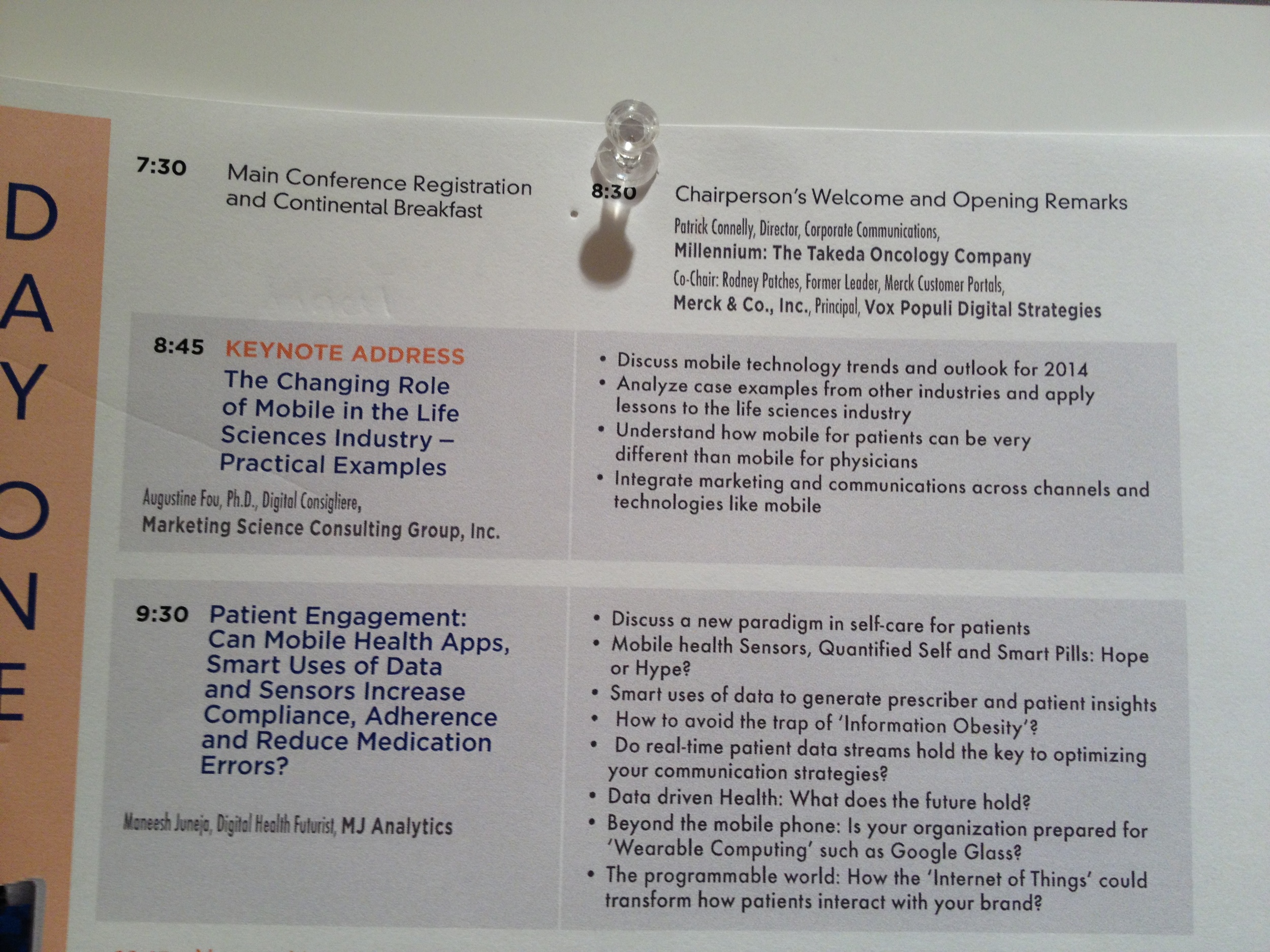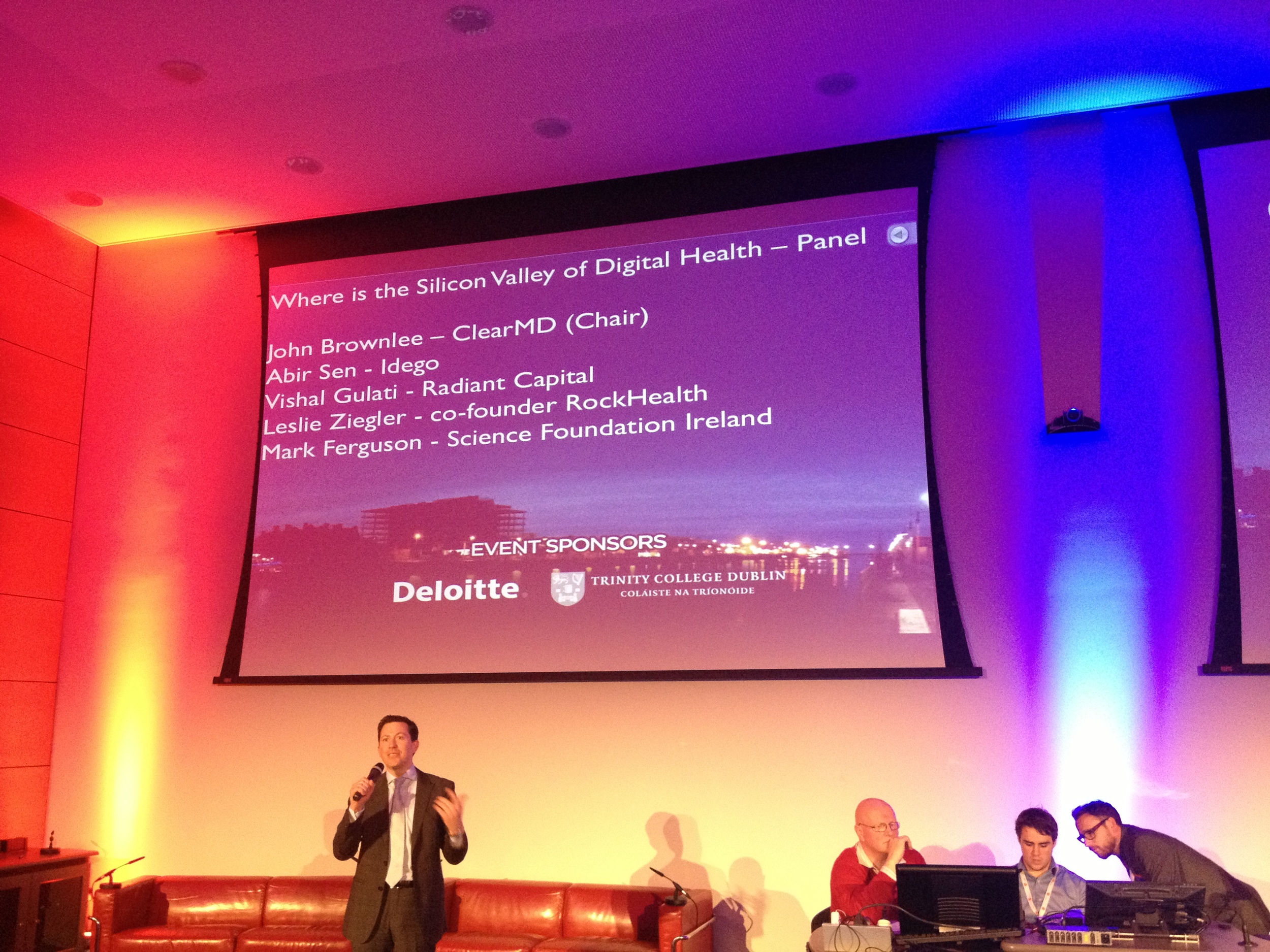Beyond the mobile phone?
So, this week has been extremely intense. On Tuesday, I gave a talk to the pharmaceutical industry at the Mobile Innovation Summit in Philadelphia. The talk was on whether emerging technologies can help patients to engage with their own health. I then headed out to Silicon Valley, and I've just attended Day 1 of Singularity University's 5 year anniversary & Alumni reunion.
Mobile Innovation Summit
This was a conference with senior decision makers attending mostly from Sales & Marketing functions from the big pharmaceutical firms. My talk was on Day 1 very early in the day.
In my talk, I shared my thoughts on what I've seen in Digital Health, and what I expect to see in Digital Health, from a mobile perspective, but with a focus on increasing compliance and adherence, and reducing medication errors. During my research, I was staggered to find statistics such as 125,000 Americans die each year because they don't adhere to their medications. The cost of non-adherence to American healthcare is $290 billion. Many people believe that Digital Health technologies can solve these problems with a click of a button.
I don't. Much of the technology I come across I consider as hype, with little or no evidence to suggest that it could solve these big problems. Not all new technology is equal. I believe in evidence based Digital Health, not just Digital Health.
I wasn't prepared for the silence, both during the talk as I engaged with the audience, and afterwards in Q&A. I thought perhaps my talk was not well received, but actually, it turns out that for many attendees, the technologies I cited were downright scary. In the world of startups that I inhabit, smart pills that automatically record that you ingested a pill, smart clothes that monitor your vital signs and apps that know you are sick before you do, are just 'normal' for me. The silence told me that these technologies were not on the radar screen for many members of the audience. I guess that's why conferences invite 'Digital Health Futurists' like myself.
Beddit Sleep sensor that makes your bed 'smart'
Now, the pharma industry are refining their corporate strategy for using mobile phones in their efforts to engage with patients, and I told them that it's not long before Wearable Computing takes us beyond the mobile phone. I also told them that 'unobtrusive' monitoring WILL be the future, not the current crop of crude and clumsy gadgets that track your activity and sleep. Products such as the sleep sensor from Beddit and MC-10's biostamp are definitely are step in the right direction.
The 'biostamp'
If you are a patient, what would you prefer? A monitoring device that you have to charge every day and sync with bluetooth, or something that requires no change in your behaviour to set it up and use it? Ultimately, one of the questions that resonated in nearly every talk given about the use of innovative mobile technology was, "Who's going to pay for it?". Finding the answer is proving to be a challenge.
5 year anniversary & Alumni Reunion
After attending FutureMed earlier this year at Singularity University, I wasn't planning on returning this year. However, the chance to help celebrate 5 years of impact, hear the pitches from this summer's Graduate Studies Program students and to mingle with alumni from around the globe was too difficult to resist. Oh, I got to hear talks from the Faculty including Peter Diamandis. At the end of Day 1, my brain hurts, after absorbing information on the new technologies coming soon that promise to change our world on a dramatic scale. Digital Biology, Artificial Intelligence, Robots, 3D printing and much more. There are innovations heading our way in the years ahead that offer the chance to meet some the grandest challenges facing humanity. Americans, particularly those in California are quite an optimistic bunch, but the folks at Singularity take it to a whole new level. I felt humbled to be in the company of so many smart individuals.
Peter Diamandis's evening lecture on Day 1
Interestingly enough, in the evening lecture, Peter Diamandis repeated my vision that I had mentioned earlier in the week to pharma, when he talked about 'dematerialization'. He asked the question, "Will 'dematerialization' make smartphones disappear and integrate them into smart clothing?". For those of you, whose products are dependent upon the mobile phone, are you prepared for the shift to Wearable Computing?
I finally got to try Glass!
I also tried Google Glass for the first time. For those of you who have not tried Google Glass, find someone who has it and try it for yourself. Most people underestimate the potential of this new era in Computing. People will laugh and say, do we need this particular innovation? Remember, people laughed at Carl Benz in 1886 and asked why do we need motorized carriages when we have horses that pulls carriages. We now have 1 billion cars on the planet.
Marc Goodman talks about 'smart' floors
I'm becoming more curious about privacy and security of our data. It was fascinating to hear an update from Marc Goodman. I had no idea that 'smart floor' technology exists that allows you to be identified based upon the way you walk. So, for example, smart floors could be used to permit access to a room in a hospital only to authorized individuals.
Not everything about the day was amazing. Just like FutureMed program I attended, the schedule is packed full of talks and demos, and for me personally, I'd like a bit more time for networking and absorbing the often highly scientific knowledge that is being shared on each slide.
Timeless wisdom
Two very different events this week. One with risk averse pharma companies who work in an extremely complex regulated environment, and another with companies founded at Singularity University willing to take the biggest risks in human history.
Which companies will survive and which companies will become dinosaurs of the 21st century?
[Disclosure: I have no commercial ties with any of the companies mentioned in this post]























































